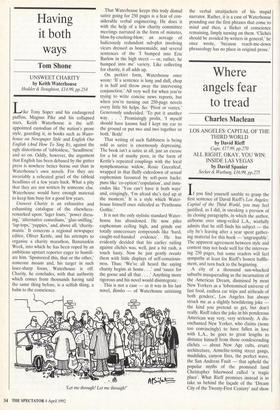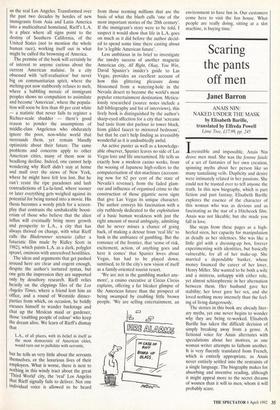Where angels fear to tread
Charles Maclean
LOS ANGELES: CAPITAL OF THE THIRD WORLD by David Rieff Cape, f17.99, pp.270 ALL RIGHT, OKAY, YOU WIN: INSIDE LAS VEGAS by David Spanier Secker & Warburg, £16.99, pp.275 If you find yourself unable to grasp the first sentence of David Rieff's Los Angeles: Capital of the Third World, you may feel justified, as I did, in sneaking a preview of its closing paragraphs, in which the author, airborne over smog-veiled L.A., wistfully admits that he still finds his subject — the city he's leaving after a year spent gather- ing material for this book — `ungraspable'. The apparent agreement between style and content may not bode well for the interven- ing 250 pages, but some readers will feel sympathy at least for Rieffs honest baffle- ment, and turn back to the beginning.
A city of a thousand sun-whacked suburbs masquerading as the incarnation of the American Dream, dismissed by most New Yorkers as a `lobotomised universe of fast food, endless car trips and airheads of both genders', Los Angeles has always struck me as a slightly bewildering joke the kind you pretend to get, but don't really. Rieff takes the joke in his ponderous American way very, very seriously. A dis- enchanted New Yorker, who claims (none too convincingly) to have fallen in love with L.A., he goes to great lengths to distance himself from those condescending clichés — about New Age cults, ersatz architecture, Armelite-toting street gangs, mudslides, canyon fires, the perfect wave, the San Andreas Fault — that uphold the popular myths of the promised land Christopher Isherwood called 'a tragic place'. What Rieff promises instead is to take us behind the façade of the `Dream City of the Twenty-First Century' and show us the real Los Angeles. Transformed over the past two decades by hordes of new immigrants from Asia and Latin America into a multicultural homeland, Rieff's L.A. is a place where all signs point to the destiny of Southern California, of the United States (not to mention the whole human race), working itself out in what might be called the browning of America.
The premise of the book will certainly be of interest to anyone curious about the current American malaise. In a city obsessed with 'self-realisation' but never big on communitarian spirit, where the melting-pot now stubbornly refuses to melt, where a babbling mosaic of immigrant peoples shows no compulsion to assimilate and become 'American', where the popula- tion will soon be less than 40 per cent white — a statistic that never fails to register a Richter-scale shudder — there's good reason to ponder the assumptions of middle-class Angelenos who obdurately ignore the poor, non-white world that surrounds them, yet remain blandly optimistic about their future. The same problems and concerns apply to other American cities, many of them now in headlong decline. Indeed, one cannot help wondering why Rieff didn't stay at home and mull over the stews of New York, where he might have felt less lost. But he can't resist the ripe paradoxes and lush contradictions of La-la-land, where sooner or later everything gets weighed against its potential for being turned into a movie. His thesis becomes a wordy pitch for a screen- play that contrasts the unshakeable boost- erism of those who believe that the alien influx will eventually bring more growth and prosperity to L.A., a city that has always thrived on change, with what Rieff calls the Bladerunner scenario (after a futuristic film made by Ridley Scott in 1982), which paints L.A. as a dark, polyglot sprawl, ominous with unresolved hostilities.
The ideas and arguments that get pushed around here are clear and cogent enough, despite the author's tortured syntax, but one gets the impression they are supported
only by desultory research. Rieff relies heavily on the clippings files of the Los Angeles Times, where a friend lent him an
office, and a round of Westside dinner- parties from which, on occasion, he boldly excuses himself to wander backstage and chat up the Mexican maid or gardener, those 'enabling people of colour' who keep the dream alive. We learn of Rieff's dismay that
L.A., of all places, with its belief in itself as the most democratic of American cities, would turn out to pullulate with servants,
but he tells us very little about the servants themselves, or the luxurious lives of their employers. What is worse, there is next to nothing in this windy tract about the great 'Third World' city, the 'real' Los Angeles that Rieff signally fails to deliver. Not one Individual voice is allowed to be heard from those teeming millions that are the basis of what the blurb calls 'one of the most important stories of the 20th century'. If the immigrant's story were to be told, I suspect it would show that life in L.A. goes on much as it did before the author decid- ed to spend some time there casting about for 'a legible American future'.
Less ambitious in its brief to investigate the tawdry success of another magnetic American city, All Right, Okay, You Win, David Spanier's insider's guide to Las Vegas, provides an excellent account of how this glittering pleasure dome blossomed from a watering-hole in the Nevada desert to become the world's most popular entertainment destination. Meticu- lously researched (source notes include a full bibliography and list of interviews), this lively book is distinguished by the author's sharp-eyed affection for a city that 'screams bad taste from slot parlour to tower block, from gilded faucet to mirrored bedroom', but that he can't help finding as irresistibly wonderful as it is undoubtedly awful.
An active punter as well as a knowledge- able observer, Spanier leaves no side of Las Vegas lore and life unexamined. He tells us exactly how a modern casino works, from the wooing of Japanese high-rollers to the computerisation of slot-machines (account- ing now for 62 per cent of the state of Nevada's revenue), from the faded glam- our and influence of organised crime to the construction of those gigantic neon signs that give Las Vegas its unique character. The author conveys his fascination with a city ruthlessly dedicated to the exploitation of a basic human weakness with just the right amount of moral ambiguity, admitting that he never misses a chance of going back, of making a detour from 'real life' to bask in the ambiance of gambling. But the romance of the frontier, that 'sense of risk, excitement, action, of anything goes and here it comes' that Spanier loves about Vegas, has had to be played down, sanitised, to fit the city's new vision of itself as a family-oriented tourist resort.
'We are not in the gambling market any- more', a casino executive at Circus Circus explains, offering a far bleaker glimpse of the American future than the prospect of being swamped by enabling little brown people. 'We are selling entertainment, an
environment to have fun in. Our customers come here to visit the fun house. What people are really doing, sitting at a slot machine, is buying time.'



























































 Previous page
Previous page